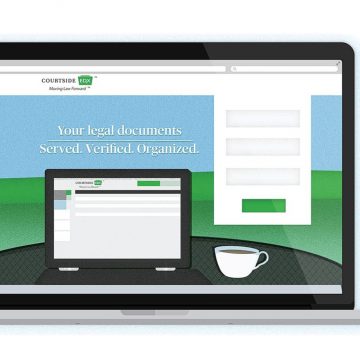When caught in the grip of a major lawsuit, lawyers on both sides have to send each other mountains of paperwork: trial records, factums, reams of disclosure. To do so, they often rely on outdated technology. Some use couriers and process servers. Many still use a fax machine.
But recently, some firms have found a better way. In January, lawyers Michael Tweyman and Arin Klug launched Courtside EDX, a website that lawyers can use to exchange documents online. Since then, about 30 firms have started using the service, including two big ones: Baker and McKenzie LLP has joined and Borden Ladner Gervais LLP signed on for a pilot project, so it can test-drive the technology this summer.
The original business idea grew out of an observation Tweyman made about his family law practice. In a typical divorce, he explains, the process often stalls as he compiles and sends documents to the other party — usually with a courier, who can then swear an affidavit of service, thereby proving to the court that shipment was successful. “This seemed incongruent with the fact that people do everything else electronically,” he recalls. So he teamed up with Klug, a childhood friend and now a tax lawyer at Robins Appleby LLP, and got to work on a website that could replace the dusty delivery methods of the past.
One of the first of its kind in Canada, Courtside EDX is straightforward to use. A lawyer simply needs to open an account, upload a file to the secure, Canada-based server and send it to opposing counsel. (Both lawyers must have an account.) Then, Courtside EDX generates a receipt, called a record of service, to confirm delivery.
To offer something truly groundbreaking, Tweyman and Klug needed the courts to accept those electronic receipts in lieu of an affidavit of service. So before launching, the duo proposed a change to Ontario’s Rules of Civil Procedure. Last summer, the rules committee approved the request, and it came into effect in January. (Ironically, the province has not yet approved the use of an online document exchange for lawyers in small claims cases or family law, so Tweyman can’t use his own website.)
Changing the province’s Rules of Civil Procedure was a big deal, but litigation firms are taking notice of Courtside EDX for two other reasons: it can store all their documents in one place and, better still, it’s cheap. “To send three boxes of documents by courier costs about $125,” says Tweyman. “We’ll do that for $8.”
That price gap piqued the interest of BLG, says Martin Felsky, counsel and head of e-discovery at the firm. After all, firms bill their clients for courier costs. “The biggest savings will be for the client,” says Felsky. “And that’s really important to us, believe it or not.”
Meanwhile, notes Tweyman, a surprising number of other firms are reluctant to try the service, despite the cost benefits. And so, rather than pitching to law firms alone, Tweyman also reaches out to institutional clients — mainly insurance companies — to explain his business. Once clients know Courtside EDX exists, Tweyman reasons, they’ll see sky-high courier costs as unnecessary cankers on their legal bills and pressure firms to join the website.
Sending documents online might sound like a wildly innovative idea, but that’s only because the legal profession so rarely embraces change, explains Klug. “The reaction we get from laypeople when we tell them what we’re doing is, ‘That doesn’t exist already?’”
This story is from our Summer 2015 issue.
Illustration by Alina Skyson



